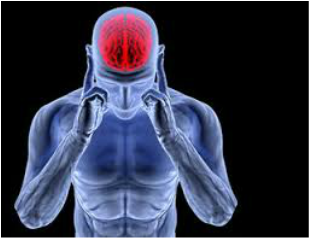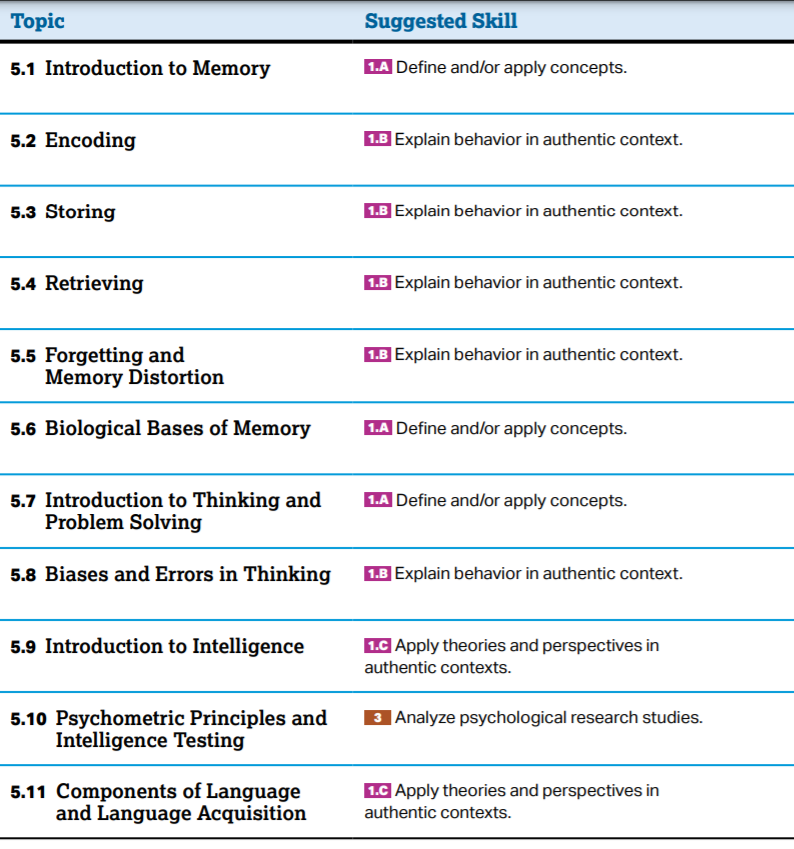Unit 5: Cognitive PsychologyThis section of the course introduces students to differences between learned and unlearned behavior . The primary focus is how humans convert sensory input into kinds of information . They examine how humans remember, and retrieve information . This part of the course also addresses problem solving, language, and creativity . An understanding of intelligence and assessment of individual differences is also highlighted in this portion of the course . Students must understand issues related to test construction and fair use .
|
MemoryObjectives:
• Compare and contrast various cognitive processes: — effortful versus automatic processing; — deep versus shallow processing; — focused versus divided attention . • Describe and differentiate psychological and physiological systems of memory (e .g ., short-term memory, procedural memory) . • Outline the principles that underlie effective encoding, storage, and construction of memories . • Describe strategies for memory improvement . Resources Remembering and Forgetting -DISCOVERING PSYCHOLOGY How We Make Memories - Crash Course Psychology #13 Remembering and Forgetting - Crash Course Psychology #14 Cognition: How Your Mind Can Amaze and Betray You - Crash Course Psychology #15 |
Language & ThoughtObjectives:
•Synthesize how biological, cognitive, and cultural factors converge to facilitate acquisition, development, and use of language . • Identify problem-solving strategies as well as factors that influence their ef fectiveness . • List the characteristics of creative thought and creative thinkers . • Identify key contributors in cognitive psychology (e .g ., Noam Chomsky, Hermann Ebbinghaus, Wolfgang Köhler, Elizabeth Loftus, George A . Miller) . Resources Language Development - DISCOVERING PSYCHOLOGY Cognitive Processes- DISCOVERING PSYCHOLOGY Language: Crash Course Psychology #16 |
Testing & Individual DifferencesObjectives:
• Define intelligence and list characteristics of how psychologists measure intelligence: — abstract versus verbal measures; — speed of processing . • Discuss how culture influences the definition of intelligence . • Compare and contrast historic and contemporary theories of intelligence (e .g ., Charles Spearman, Howard Gardner, Robert Sternberg) . • Explain how psychologists design tests, including standardization strategies and other techniques to establish reliability and validity . • Interpret the meaning of scores in terms of the normal curve . • Describe relevant labels related to intelligence testing (e .g ., gifted, cognitively disabled) . • Debate the appropriate testing practices, particularly in relation to culture-fair test uses . • Identify key contributors in intelligence research and testing (e .g ., Alfred Binet, Francis Galton, Howard Gardner, Charles Spearman, Robert Sternberg, Louis Terman, David Wechsler) . Resources Testing and Intelligence- DISCOVERING PSYCHOLOGY Controversy of Intelligence: Crash Course Psychology #23 Brains Vs. Bias: Crash Course Psychology #24 Beautiful Minds: Stephen Wiltshire |

